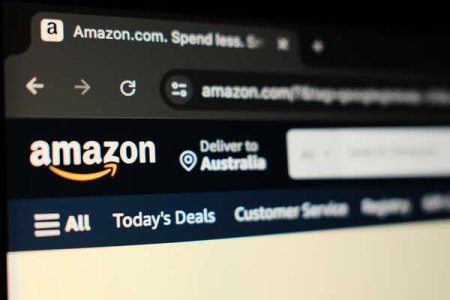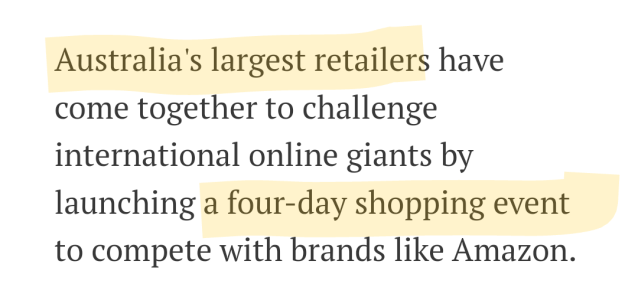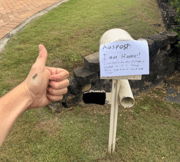Local legends unite: Aussie retailers launch shopping showdown against global giants!
- Replies 7
In a David versus Goliath-style showdown, Australian retailers are banding together in an exciting weekend shopping event aimed at enticing consumers and showcasing local offerings to take on the might of a global retail giant.
With enticing deals and unique products on offer, this event promises to create a buzz in the retail landscape, drawing attention to the value of shopping local.
As brands unite for this strategic push, consumers can look forward to an engaging experience filled with special promotions and a celebration of Australian innovation.
Australia's largest retailers have come together to challenge international online giants by launching a four-day shopping event to compete with brands like Amazon.
Since Amazon arrived on Australian shores in 2017, the company has invested approximately $15 billion in expanding its operations.
With massive warehouses capable of housing millions of stock items, Amazon has established a formidable presence in major Australian cities, employing roughly 7,000 people, along with many more involved in constructing the massive warehouses.
Sandra McNeil, Amazon Australia's Operations Manager, has stated that this investment is aimed at broadening Amazon's operational footprint, offering customers a wider variety of products and faster delivery times.

Research by Roy Morgan revealed that 7.9 million Australians aged 14 and older made at least one purchase from Amazon in the last financial year.
This figure reflects an increase of over 1 million shoppers compared to the previous year.
During the same timeframe, Australian retailers like David Jones and Target experienced a loss of between five and seven per cent of their customer base.
‘On average, Australian Amazon shoppers are purchasing six times a year on the platform—almost as frequently as Kmart customers shop at Kmart (with an average of 7.5 times),’ a spokesman from Roy Morgan reported.
‘A large proportion are high-frequency customers, with 3 in 10 Amazon shoppers making a purchase seven or more times over a 12-month period.’
Roy Morgan found that Amazon intends to enter the ‘big box retail’ sector, providing Australian consumers with furniture and large electrical items when it opens a dedicated warehouse in Sydney in 2026.
The research also suggested that the online giant plans to target the ‘ultra-cheap’ retail market by offering non-branded products priced under $30, which would be shipped directly from China to consumers.
Laura Demasi, Head of Retail Research at Roy Morgan, noted that Amazon's impressive growth during a time when Australian retailers are competing for a share of shrinking disposable incomes indicates a significant shift in the retail landscape.
‘The disruptive power of Amazon has been under-appreciated in recent years, but this kind of growth trajectory puts all Australian retail brands on notice—especially now given its upcoming expansion into big box retail and the ultra-cheap market,’ she pointed out.
‘If Australia is on track to mirror the US trend, where Amazon accounts for an incredible 37.4 per cent of all online spend, our retail landscape could look quite different in coming years.’
Wesfarmers, one of Australia's largest publicly listed companies, operates major retailers, including Bunnings, Kmart, Target, Officeworks, Priceline, and catch.com.au.
The company has recently introduced a membership program called OnePass, which provides exclusive discounts on thousands of products for a fee.
This program is akin to those offered by other online retailers like Amazon, which gives Prime members special access to online shopping events.
Nicole Sheffield, Managing Director of Wesfarmers OneDigital, noted that they operate in a constantly evolving retail landscape and are continuously seeking to enhance the customer experience.
She mentioned that a subscription-based program could provide Australians with greater value while fostering brand loyalty across their various offerings.
‘The great thing for us is that OnePass is underpinned by brands that Australians trust,’ Ms Sheffield stated.
‘Bunnings and Kmart are repeatedly the most trusted brands voted over and over again above any other brands in Australia.’
‘For us it is about continuing to build on that trust and just offer Australians great value,’ she added.

Ms Sheffield noted that the rise of foreign companies like Amazon in Australia has prompted local retailers to improve their operations.
She remarked that the presence of these global giants demonstrates that it's feasible to offer next-day delivery, deliver excellent value, and quickly import international products to Australia.
‘Australians win, and consumers are savvy, but it is on us to keep them shopping with us,’ Ms Sheffield said.
‘Australians love Australia, and they are inherently loyal, but at the same time, they love a good deal.’
‘It is incumbent on us not to just rest on our trusted brands but actually deliver great value, and that is what we are always focused on,’ she continued.
Ms Sheffield noted that consumers quickly connected with OnePass, recognising the value of the offerings available to them.
‘The take-up has been fantastic, and we have seen [that] when people become a OnePass member, they shop a lot more,’ she said.
Melbourne mum Angelique Oliver recently joined the program.
Living 30 minutes from the nearest shopping area and with two young children, she found that within two months of becoming a member, she noticed significant savings and appreciated the convenience of purchasing everyday items.
‘Getting out had become this whole day out. I feel like we live in the country, but we still live in Melbourne, would you believe,’ she shared.
‘It was like we had to do a big day trip out to the city to go and buy something, when you put an hour on the drive into the equation, it was quite a lot of time and effort.’
‘When it is all these brands you use daily, it was a no-brainer,’ Ms Oliver added.
She also mentioned that shopping with Australian retailers via OnePass gave her confidence in her purchases, as opposed to buying unfamiliar items from overseas.
‘You know it will be Australian measurements, and it won’t mix up inches with centimetres. If there is a problem, you can just walk into the shop and speak to a real person,’ Ms Oliver said.
‘Everyone is having a really hard time with this cost of living crisis, and the best thing we can do is to support the Australian economy by buying Australian.’
‘That will help us all really. Why would we send our money overseas,’ she continued.
As Australian retailers band together to challenge global giants with an enticing weekend shopping event, trust becomes a crucial factor in the competition.
Roy Morgan's recent findings highlight the retail landscape's dynamics, revealing which brands Australians trust the most.
This information not only influences consumer choices but also underscores the importance of loyalty in a market increasingly dominated by international players.
Understanding these trust dynamics can provide insight into how local brands can successfully attract consumers during such significant retail events.
 So, dear members of the Seniors Discount Club, are you planning to participate in this weekend's shopping spree? Have you noticed any changes in your shopping habits since the rise of online giants like Amazon? We’d love to hear your thoughts in the comments below!
So, dear members of the Seniors Discount Club, are you planning to participate in this weekend's shopping spree? Have you noticed any changes in your shopping habits since the rise of online giants like Amazon? We’d love to hear your thoughts in the comments below!
With enticing deals and unique products on offer, this event promises to create a buzz in the retail landscape, drawing attention to the value of shopping local.
As brands unite for this strategic push, consumers can look forward to an engaging experience filled with special promotions and a celebration of Australian innovation.
Australia's largest retailers have come together to challenge international online giants by launching a four-day shopping event to compete with brands like Amazon.
Since Amazon arrived on Australian shores in 2017, the company has invested approximately $15 billion in expanding its operations.
With massive warehouses capable of housing millions of stock items, Amazon has established a formidable presence in major Australian cities, employing roughly 7,000 people, along with many more involved in constructing the massive warehouses.
Sandra McNeil, Amazon Australia's Operations Manager, has stated that this investment is aimed at broadening Amazon's operational footprint, offering customers a wider variety of products and faster delivery times.

Aussie brands have teamed up for a four-day shopping event to compete with global e-commerce giant Amazon, offering consumers substantial savings. Credit: Shutterstock
Research by Roy Morgan revealed that 7.9 million Australians aged 14 and older made at least one purchase from Amazon in the last financial year.
This figure reflects an increase of over 1 million shoppers compared to the previous year.
During the same timeframe, Australian retailers like David Jones and Target experienced a loss of between five and seven per cent of their customer base.
‘On average, Australian Amazon shoppers are purchasing six times a year on the platform—almost as frequently as Kmart customers shop at Kmart (with an average of 7.5 times),’ a spokesman from Roy Morgan reported.
‘A large proportion are high-frequency customers, with 3 in 10 Amazon shoppers making a purchase seven or more times over a 12-month period.’
Roy Morgan found that Amazon intends to enter the ‘big box retail’ sector, providing Australian consumers with furniture and large electrical items when it opens a dedicated warehouse in Sydney in 2026.
The research also suggested that the online giant plans to target the ‘ultra-cheap’ retail market by offering non-branded products priced under $30, which would be shipped directly from China to consumers.
Laura Demasi, Head of Retail Research at Roy Morgan, noted that Amazon's impressive growth during a time when Australian retailers are competing for a share of shrinking disposable incomes indicates a significant shift in the retail landscape.
‘The disruptive power of Amazon has been under-appreciated in recent years, but this kind of growth trajectory puts all Australian retail brands on notice—especially now given its upcoming expansion into big box retail and the ultra-cheap market,’ she pointed out.
‘If Australia is on track to mirror the US trend, where Amazon accounts for an incredible 37.4 per cent of all online spend, our retail landscape could look quite different in coming years.’
Wesfarmers, one of Australia's largest publicly listed companies, operates major retailers, including Bunnings, Kmart, Target, Officeworks, Priceline, and catch.com.au.
The company has recently introduced a membership program called OnePass, which provides exclusive discounts on thousands of products for a fee.
This program is akin to those offered by other online retailers like Amazon, which gives Prime members special access to online shopping events.
Nicole Sheffield, Managing Director of Wesfarmers OneDigital, noted that they operate in a constantly evolving retail landscape and are continuously seeking to enhance the customer experience.
She mentioned that a subscription-based program could provide Australians with greater value while fostering brand loyalty across their various offerings.
‘The great thing for us is that OnePass is underpinned by brands that Australians trust,’ Ms Sheffield stated.
‘Bunnings and Kmart are repeatedly the most trusted brands voted over and over again above any other brands in Australia.’
‘For us it is about continuing to build on that trust and just offer Australians great value,’ she added.

OnePass is a subscription program providing competitive deals across trusted retail brands to boost customer loyalty and value. Credit: Instagram / @onepassau
Ms Sheffield noted that the rise of foreign companies like Amazon in Australia has prompted local retailers to improve their operations.
She remarked that the presence of these global giants demonstrates that it's feasible to offer next-day delivery, deliver excellent value, and quickly import international products to Australia.
‘Australians win, and consumers are savvy, but it is on us to keep them shopping with us,’ Ms Sheffield said.
‘Australians love Australia, and they are inherently loyal, but at the same time, they love a good deal.’
‘It is incumbent on us not to just rest on our trusted brands but actually deliver great value, and that is what we are always focused on,’ she continued.
Ms Sheffield noted that consumers quickly connected with OnePass, recognising the value of the offerings available to them.
‘The take-up has been fantastic, and we have seen [that] when people become a OnePass member, they shop a lot more,’ she said.
Melbourne mum Angelique Oliver recently joined the program.
Living 30 minutes from the nearest shopping area and with two young children, she found that within two months of becoming a member, she noticed significant savings and appreciated the convenience of purchasing everyday items.
‘Getting out had become this whole day out. I feel like we live in the country, but we still live in Melbourne, would you believe,’ she shared.
‘It was like we had to do a big day trip out to the city to go and buy something, when you put an hour on the drive into the equation, it was quite a lot of time and effort.’
‘When it is all these brands you use daily, it was a no-brainer,’ Ms Oliver added.
She also mentioned that shopping with Australian retailers via OnePass gave her confidence in her purchases, as opposed to buying unfamiliar items from overseas.
‘You know it will be Australian measurements, and it won’t mix up inches with centimetres. If there is a problem, you can just walk into the shop and speak to a real person,’ Ms Oliver said.
‘Everyone is having a really hard time with this cost of living crisis, and the best thing we can do is to support the Australian economy by buying Australian.’
‘That will help us all really. Why would we send our money overseas,’ she continued.
As Australian retailers band together to challenge global giants with an enticing weekend shopping event, trust becomes a crucial factor in the competition.
Roy Morgan's recent findings highlight the retail landscape's dynamics, revealing which brands Australians trust the most.
This information not only influences consumer choices but also underscores the importance of loyalty in a market increasingly dominated by international players.
Understanding these trust dynamics can provide insight into how local brands can successfully attract consumers during such significant retail events.
Key Takeaways
- Aussie brands have collaborated to launch a four-day shopping event challenging global e-commerce giant Amazon and offering consumers significant savings.
- Research by Roy Morgan highlighted that 7.9 million Australians shopped at Amazon during the last financial year, indicating a rapid increase in Amazon's customer base, while traditional Australian retailers experienced customer loss.
- Wesfarmers, one of Australia's largest companies, introduced OnePass—a subscription-based program offering competitively priced deals across a range of trusted Australian retail brands, aiming to enhance customer loyalty and value.
- Local retailers are acknowledging the need to innovate and offer compelling value to Australian consumers amidst the expansion of foreign companies like Amazon, which has demonstrated the feasibility of next-day delivery and access to global products.









